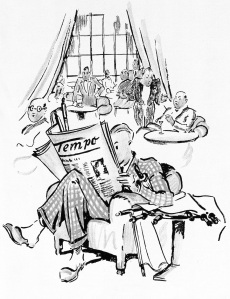In preparation:
A Moderate Modernity
The Newspaper Tempo and the Collapse of the Weimar Republic, 1928-1933
(forthcoming with University of Michigan Press)
The years from 1928 to 1933 represent one of the most decisive eras in German, European and global history: during these five years, the Weimar Republic, Germany’s first democratic regime, deteriorated into an increasingly authoritarian state that finally saw Adolf Hitler appointed as Chancellor. The newspaper Tempo is a unique witness to this extraordinary process. Founded in Berlin in 1928 by the Jewish publishing firm Ullstein as ‘Germany’s most modern newspaper’, this mass-market tabloid aimed to recruit new voter groups, such as women, young people and white-collar workers, to the Republic’s cause. Constructing a positive and optimistic image of Weimar as a modern democracy, Tempo was defined – and attacked – as one of the most vivid symbols of ‘Westernisation’ by far-right agitators, the communist press and contemporary artists like Fritz Lang and John Heartfield. In the volatile political and economic climate after 1930, and under increasing pressure from the rising National Socialist movement, Ullstein gradually changed Tempo’s vision for Germany’s future into that of a controlled and tamed modernity.
Despite its central role in Weimar’s contemporary culture, Tempo has not yet been the subject of a detailed study – a research gap this book aims to fill. Situating it in the wider political culture of the time, the book analyses the paper’s contributions to important public debates on democracy, consumption and the role of women in society, and how these contributions changed over its period of publication from 1928 till 1933. This discursive change will act as a case study for the broader concept of ‘moderate modernity’, the contemporary idea of a particularly German brand of modernity, purged of its threatening aspects.

0 Comments